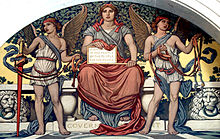- Monetary authority
-
Part of a series on Government Public finance  Tax policy · Budgetary policy
Tax policy · Budgetary policy
Revenue · Spending · Budget
Deficit or Surplus · Deficit spending
Debt (External · Internal)
Finance ministry · Fiscal unionMoney supply · Interest rate
Monetary base · Discount window
Reserve requirements
Bank reserves · Gold reserves
Monetary authority (Central bank · Currency board) · Monetary unionTariff · Non-tariff barrier
Balance of trade · Gains from trade
Trade creation · Trade diversion
Protectionism · Free trade
Commerce ministry · Trade blocReformMonetary authority is a generic term in finance and economics for the entity which controls the money supply of a given currency, and has the right to set interest rates, and other parameters which control the cost and availability of money. Generally a monetary authority is a central bank, though often the executive branch of a government has de facto control over monetary policy by controlling the central bank. There are other arrangements, for example democratic governance of monetary policy, a central bank for several nations, a currency board which restricts currency issuance to the amount of another currency, free banking where a broad range of entities can issue notes or coin.
Contents
Americas
Asia
- Hong Kong Monetary Authority
- Maldives Monetary Authority
- Monetary Authority of Singapore
- Royal Monetary Authority of Bhutan
- Reserve Bank of India
- State Bank of Pakistan
Middle East
- Palestine Monetary Authority
Oceania
See also
- Central bank
- deflation
- fiat money
- gold standard
- hyper-inflation
- inflation
- monetarism
- seignorage
Categories:- Central banks
- Money stubs
Wikimedia Foundation. 2010.
